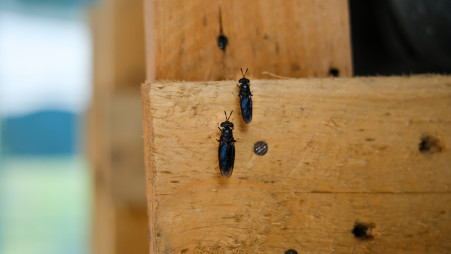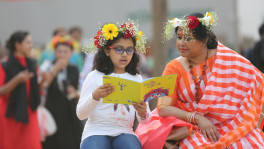Meet the ex-BCL leader taking a lead in black soldier fly farming
In the last couple of years, farming of black soldier flies as a cheap alternative protein source for animal feed, is gaining popularity among some well-informed Bangladeshi farmers. Duranta Biplob, a former BCL leader and still an active Awami League member, is among those in the forefront

From a plastic jar half-full of decomposed dirt that looked like earth, Duranta Biplob scooped up a handful of maggots. Harvesting one-kilogram black soldier larvae (at this stage, generally, called maggots) requires a minimum of four kilograms of waste.
"Amid increasing price of poultry and aquaculture feed, and concerns over substandard as well as toxic feed, black soldier flies can be the best and cheapest alternative," Duranta claimed, working in his organic farm on 100-bigha land in Keraniganj, Dhaka.
The Sonamati Agro farm owner, also the ex-general secretary of the Jahangirnagar university unit of Bangladesh Chhatra League, said this particular form of insect farming has two benefits: sourcing nutrient-rich animal feed and cleaning the environment through an insect-based waste management process.
On the terrace of the tin-shed farmhouse, there were several plastic jars placed on a steel rack, for incubating eggs and hatching larvae.

Near the farmhouse, the harvesting plant was set on shallow concrete cubicles. The cubicles were covered with manure. As we got close, we saw millions of larvae wriggling around. The pupae on the edge of becoming adults were shifting to a dry place, as if ridding themselves of the dirt.
There was a 'love cage' - a makeshift shed wrapped in a mosquito net - near the harvesting plant. This was the mating place. There we saw bundles of wooden sticks where the adult female flies were laying eggs.
Interestingly, the place was free of any smell. The black soldier flies have powerful chewing mouthparts, allowing them to shred and devour waste. The little creatures are able to digest organic compounds much before they decompose, thereby eliminating odour.
Duranta said all the larvae and pupae there were ready to be sold.

Over the last couple of years, farming of black soldier flies is gaining popularity among some well-informed Bangladeshi farmers, following numerous experiments conducted in regions across the West, Africa and Asia, over the last decade.
Why? Black soldier fly (Hermetia illucens) as a cheap alternative protein source for animal feed appears to have promising market potential. It carries 40% crude protein, 35% crude fat and fibre, manganese, sodium, iron, potassium and vitamin in a single larva, according to several articles of the UN agency Food and Agriculture Organisation (FAO).
One FAO article published in 2017 read, "Their [black soldier flies] biggest advantage over other insects is their ability to convert waste into food, generating value and closing nutrient loops as they reduce pollution and costs."
Meticulous Market Research has already predicted that the black soldier fly market is expected to reach $3.96 billion by 2033.
The true meaning of politics
Despite having graduated from the drama and dramatics department, Duranta always wanted to be an entrepreneur.
But he had another motivation as well. Duranta wanted to change the public perception that a student involved in politics can hardly come to the welfare of society.
"People tend to see a politician as a bad guy or a cheater. I wanted to change this mindset," said Duranta, adding, "politicians should have ideals, which is rare at present. Thus, in the spirit of Sonar Bangla, I involved myself in agriculture."
Two decades ago, Duranta - also an agriculture and cooperative affairs sub-committee member of Awami League - initiated organic farming on his ancestral land at Purbadhala upazila in Netrokona district. Later, during the outbreak of the Covid-19 pandemic, he shifted his farm to the Keraniganj land. At the Sonamati Agro field, he cultivates vegetables besides farming fish and cattle.

To access non-toxic as well as cheap feed, Duranta initiated black soldier fly farming.
He said black soldier flies are wild insects available across the tropical and subtropical regions in the world. There are thousands of varieties of flies, but the black soldiers are different in characteristics.
"Black soldier flies keep away from human gatherings. Markish bushes are their habitats. The flies are non-pest and don't carry any transmissible diseases. They don't bite," he said, adding that feed price per kilogram can be cut down by half (from Tk60 at present to Tk30) by scaling up the production of black soldier flies.
Value at every stage
The life cycle of a black soldier fly is approximately 45 days. In all stages: egg, larvae, pupae and adult, the fly is valuable in the emerging market.
Adult black soldier flies mate in flight and females deposit egg masses, about 500-800 eggs, at crevices of a bundle of wooden sticks. This is the first stage. Hatchers can sell the eggs at Tk150 per kilogram.
In the second stage, larvae grow from the eggs in around 22 days. At this stage, the larvae are collected for poultry and fish farms. Each kilogram of larvae would cost Tk200. Farmers can serve either the live larvae or dried larvae as poultry, fish and pet feed.
In the third stage, pupae (also called mother fly) are made from larvae and sold at Tk500 per kilogram. Protein-rich powder, oil and oil cake can be manufactured from the pupae. Moreover, the hard shells of the flies can be used for extracting chitin, which is widely used in skin and hair care products.
Within a week, the pupae become adult flies and survive over the next 8-10 days for breeding. The larvae and pupae thrive on biodegradable waste like kitchen and restaurant leftovers, chicken residues, rotten fruits and anything that is perishable.

"Even the dead flies can be used as animal feed. That means, the insect leaves no residue," Duranta said, adding that harvesting the black soldier flies requires minimal investment and arrangement.
An economic alternative
When Duranta started insect farming a year ago, the price of each kilogram of larvae was Tk4,000. But now, he sells 1kg of larvae at Tk500. Monthly, he harvests around one tonne of larvae and pupae.
A Munshiganj-based poultry farmer Nuruzzaman collected 5kg pupae from the Sonamati Agro farm one month ago. The pupae grew into adults and bred eggs. Nuruzzaman, now serves his broiler chicken with the larvae.
He has a poultry farm of around 600 chickens. As the price of the conventional poultry feed became expensive - Tk3,300 per 50kg bag - he started insect farming.
"The chickens treat the larvae as a delicious feed. This alternative feed has reduced my farm's dependency on the conventional feed by at least 50%," Nuruzzaman said.
There are around 100 individual farmers running insect farming in the country.
Munim Sarkar, one of them, is so passionate about this farming that he has created a Youtube channel, Farmer Father, to disseminate necessary information about black soldier flies to a greater audience.
A postgraduate student of political science at Dhaka University, Munim launched insect farming in Joypurhat district in March 2020. Occasionally, he conducts free seminars and training sessions on insect farming.
"I strongly believe that small, as well as big agripreneurs, can profit hugely from the industrial production of black soldier larvae," Munim said.
Currently, larvae of the insect are widely marketed in the United States, Canada, the Netherlands, France, England, Germany, Finland, Belgium, China, South Korea, Japan, Malaysia, Vietnam and Thailand.
FAO has recommended small-scale poultry and fish farmers adopt the identified methods for its cultivation as a way of lowering production costs and also contributing to environmental hygiene and sanitation. The US Food and Drug Administration also has approved the insect as feed for poultry and salmon.

However, Department of Livestock Service (DLS) officials think that farming of black soldier flies requires further research in Bangladesh before wide-scale application.
"Although there are no proven disadvantages of black soldier fly farming outside Bangladesh, we are still sceptical about its pros and cons because there are no scientific studies that have been conducted here. Bangladesh Livestock Research Institute (BLRI) should research on this," said a senior DLS officer requesting anonymity.
TBS spoke with BLRI Director General Dr SM Jahangir Hossain who said he has no information about this particular form of insect farming.


 Keep updated, follow The Business Standard's Google news channel
Keep updated, follow The Business Standard's Google news channel















